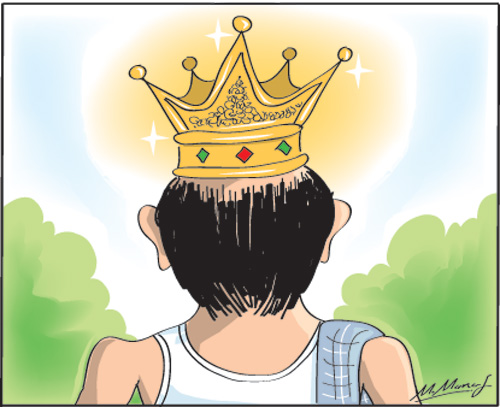Sunday Times 2
The story of a simple village headman
View(s):Once upon a time, a long time ago in a country far away, there lived a simple village headman.
He was not the cleverest man in the village. All he had to do was keep the peace and collect revenue, allowing the prominent families in that village to wield influence and power.
Now the particular village where he functioned as a ‘Headman’ (the equivalent during colonial times of today’s grama niladiris) belonged to a small kingdom which was being ruled by the head of one of that nation’s prominent families, a charismatic man known as Prince Percy. The kingdom itself had a funny system of rulership – every so many years, the people of the kingdom would get together and vote to decide which of the many princes in the kingdom would function as their King. For the past several years, the moustachioed Prince Percy (now known as King Percy) had been ruling the nation, his popularity being largely due to the fact that some years ago he had single-handedly fought and destroyed a fierce and ruthless Tiger Monster that had been ravaging the kingdom for nearly a quarter century.
Waiting in the wings and hoping to succeed King Percy when the latter finally retired was the head of another prominent family, the visionary but dull Prince Toddy-Blue. Sadly for the people of that democratic kingdom, they had no other choice. Their only options were to be ruled by one of the two princes Percy or Toddy-Blue, a situation that many compared to Hobson’s choice — or a choice between the Devil and the Toddy-Blue sea.
While the two princes would falsely smile at each other when they met while they plotted to outmanoeuvre each other, our simple headman was content to remain in the background, busying himself with looking after the Agriculture and the Health of the people in that area. He lived a quiet and unostentatious village headman’s life. As the people used to say in their classic manner, “eyaa thamange paaduwethamai unnay”.
Unfortunately for the village, some mischief-makers who wanted to create trouble secretly came to the village headman one day and gave him the idea that he too could elevate himself to the same level of prominence as the two princes, Percy and Toddy-Blue. “Why” they asked him, “should privilege and power alternate only between those two houses? Don’t we all know that in this country, if you wash the mud off a farmer he is as good as a king?”
So, just as the three witches tempted Macbeth, these mischief makers and false prophets tempted our village headman to usurp power.
Around this time the courtiers around Prince Percy were blatantly making use of his popularity and making lots and lots of money for themselves.
The people began to feel that King Percy had passed his “Use By” date. So our wily headman paid a courtesy call on King Percy and was invited to stay for dinner. After they had enjoyed a sumptuous meal of hoppers (King Percy being well known for his bonhomie and generosity), the headman went home – and the following day he went round, ungratefully proclaiming from the rooftops and platforms to all and sundry that King Percy was actually a VERY BAD person. He exhorted the people to reject Percy and vote him into power instead – and promised to rule Most Benevolently.
So believing that our headman was a genuine and honest man who was loyal to his country and had the welfare of its people at heart, the people hailed him as a hero and voted to oust King Percy. He was helped to fulfil his plans by Prince Toddy-Blue, who (being well aware that he could not replace the popular Percy via an election) judged that it was better to have the simple headman as king rather than putting up with Percy as King for another six years.
The fact that the headman had betrayed his King was lost on the gullible people. Within a short time the man was proclaimed King. He anointed himself with the pleasing name of “King Benevolence”- and to reward Prince Toddy-Blue for his assistance proclaimed him chief of his council of ministers.
Both Prince Percy and Prince Toddy-Blue had to accept the headman (just as in Simon Nawagaththegama’s play Suba saha Yasa) as the new ruler of their land. Both however secretly looked down on him as just a jumped up village headman.
It was not for nothing that Baron Acton said “Power tends to corrupt, and absolute power corrupts absolutely”. Just as Macbeth, the once honorable Thane of Glamis, underwent a transformation from good to evil after he became King of Scotland, our simple village headman gradually got used to the taste of power. Despite loudly proclaiming in the presence of respected members of the clergy and within the temples of his gods that he would only rule for one term, King Benevolence decided as he neared the end of his term that he would like to stay on as King.
But herein lay a problem. How could he ensure that the two Princes – Percy and Toddy-Blue – would not challenge him?
The answer was easy. King Benevolence decided, just as Macbeth engineered the killing of his friend Banquo, that he would get rid of his ally Prince Toddy-Blue by stabbing HIM in the back.
What better way to remain King than to kill two birds with one stone – or to emasculate two princes with one stroke? All he had to do was to dismiss Toddy-Blue as his Chief Minister and appoint his former enemy Percy as the new Chief Minister, thus ensuring that Percy would not challenge him when the time came to seek the mandate of the people for a second term as King.
Sadly for the people of the country, King Benevolence had miscalculated and over-reached himself. Despite being King, he still had the mind of a village headman – and like America’s Donald Trump — he was used to thinking with his gut rather than his brain. He had never bothered to understand the rules and regulations of government that he was supposed to exercise. He had never bothered to educate himself by watching Simon Nawagatththegama’s play Suba saha Yasa or Shakespeare’s play Macbeth – nor had he read the works of Kautilya or Machiavelli.
History often shows us that those who find themselves in high political office often become deluded into believing that they can control events and that they do not need to follow rules and laws.
So, pursuing his ambition with scant regard for the welfare of his people, the village headman plunged the entire nation into chaos.
It was a state of chaos that not even the late evil Tiger Monster could have created.

